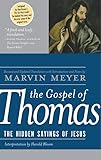The Gospel of Thomas : the hidden sayings of Jesus / translation, with introduction, critical edition of the Coptic text & notes by Marvin Meyer ; with an interpretation by Harold Bloom.
Material type: TextPublication details: New York: HarperSanFrancisco 1992Description: 130p. ; 20cmISBN:
TextPublication details: New York: HarperSanFrancisco 1992Description: 130p. ; 20cmISBN: - 9780060655815 (recycled, acid-free paper)
- BS2860.T5 A3 1992
 Book
Book
| Current library | Collection | Call number | Copy number | Status | Barcode | |
|---|---|---|---|---|---|---|
| Bishop Okullu Memorial Library (Limuru Campus) General Circulation | Non-fiction | BS2860.T5 A3 1992 (Browse shelf(Opens below)) | 1 | Available | 045812 |
Includes bibliographical references.
"In this fresh and masterful translation, Marvin Meyer presents one of the world's best-loved sacred texts. Honed over the last twenty years through a dozen versions, Meyer's Thomas promises to remain the definitive translation for decades to come." "Widely regarded by scholars as containing many of the original sayings of Jesus, The Gospel of Thomas was discovered in 1945 among the gnostic texts at Nag Hammadi in Upper Egypt. Reportedly dictated by Jesus to his brother, Judas Thomas the Twin, founder of the churches of the East, Thomas reveals a Jesus who merges with the wisdom of the sophists, with Diogenes, Plato, and Socrates." "In his interpretation, Harold Bloom writes about the Jesus who touches him, the uncanny voice he hears in the Gospel of Thomas, free of the dogmatic cast that has held Jesus in ecclesiastical captivity since the canonical Gospels were written. "Seeing what is before you is the whole art of vision for Thomas's Jesus," he writes. "Nothing mediates the self for the Jesus of the Gospel of Thomas. Everything we seek is already in our presence, and not outside our self. What is most remarkable in these sayings is the repeated insistence that everything is already open to you. You need but knock and enter."" "Through Marvin Meyer's lucid rendering of Christ's Zen master-like sayings we witness a gospel that, as Bloom puts it, "spares us the crucifixion, makes the resurrection unnecessary, and does not present us with a God named Jesus. No dogmas could be founded upon this sequence (if it is a sequence) of apothegms. If you turn to the Gospel of Thomas, you encounter a Jesus who is unsponsored and free.""--Jacket.
There are no comments on this title.
